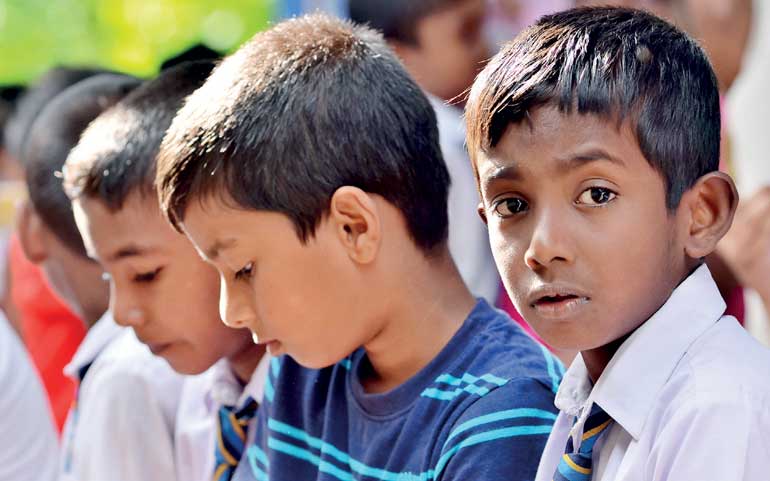Tuesday Mar 03, 2026
Tuesday Mar 03, 2026
Thursday, 8 March 2018 00:00 - - {{hitsCtrl.values.hits}}

By Ganeshan Wignaraja and Adam Collins
The Local Government elections and changes in the Cabinet have cast a shadow over Sri Lanka’s stance on globalisation and its market-oriented economic reforms. Influential voices are arguing for shunning globalisation and backtracking on some key reforms. Meanwhile, others suggest spreading the benefits of globalisation throughout Sri Lanka but policy details are sketchy.
Is globalisation over in Sri Lanka?
Sri Lanka’s post-2015 strategy of attracting greater Foreign Direct Investment (FDI) and diversifying exports had some initial success, with export revenues and FDI inflows hitting record highs last year. But this agenda was already facing external challenges due to the backlash against globalisation in developed economies, which are Sri Lanka’s major export markets. And the Local Government polls now appear to have intensified the internal challenge to this agenda, due to domestic political upheaval.
These developments have led to suggestions that reforms like Free Trade Agreements (FTAs) and the transfer of State-owned assets to foreigners should be abandoned. Such an abandonment would be a mistake, for three reasons:
First, the rationale behind maintaining economic openness in Sri Lanka remains compelling. Sri Lanka has neither oil nor a large domestic market to drive its economy. An abundance of literate labour and some land are the basis of its comparative advantage and trade.
Not surprisingly, past attempts at developing the economy through inward-looking policies soon stalled, with inefficient State-Owned Enterprises acting as a drag on the budget and the balance of payments. Moreover, if it backtracked on openness now, Sri Lanka would miss out on the rising demand for exports and FDI flows driven by the current cyclical upswing in the global economy.
Second, while the ‘hyper-globalisation’ era of the early 2000s is unlikely to be revived, a significant reversal in global trade and FDI flows does not appear to be on the cards. Even as the US steps back from leading a liberal global order, China, India and ASEAN are jostling to be the new torchbearers of globalisation.
Meanwhile, despite the US withdrawal, the remaining 11 countries of the Trans-Pacific Partnership (TPP) have revived the TPP trade arrangement, and negotiations continue towards finalising the similarly ambitious Regional Comprehensive Economic Partnership (RCEP) trade agreement in Asia.
Finally, if Sri Lanka shuns globalisation, it risks being left behind by others in South Asia who are continuing to embrace it. Prime Minister Modi’s progress in improving India’s business environment and attracting foreign investment has been particularly impressive. He has implemented a flurry of reforms including a nationwide sales tax, the ‘Make in India’ initiative, demonetisation of large currency notes, fiscal reform, investment climate reform, and new social security programmes. Sri Lanka is well positioned to benefit from these policy changes too, provided it remains open to trade and investment.
Reforms must continue
Sri Lanka should, instead, continue with gradual market-oriented reforms. An immediate priority is the ratification of the landmark Sri Lanka-Singapore FTA to attract FDI and foster entry of local service firms into global value chains. As this is Sri Lanka’s first new FTA since 2005, it would signal that Sri Lanka is open for international investment and trade.
Sri Lanka should also leverage existing ties with Singapore to maximise the benefits of the FTA. One way it could do so is to seek the help of Singapore’s Economic Development Board, a world leader in attracting FDI, to restructure Sri Lanka’s Board of Investment, towards purely promoting FDI and away from regulating FDI and managing export processing zones.
More generally, it is vital to cut the red tape hampering businesses to attract greater FDI from other sources and make Sri Lankan exports more competitive. It takes as much as nine days to start a business in Sri Lanka and only 2.5 days in Singapore.1 Some progress has been made, including the launch of the LankaPay Online Payment Platform last year,2 which allows firms to make online customs payments through any bank. This kind of ‘e-government’ should be pursued further. For example, an online tax payment system would speed up business activity and reduce the risk of corruption.
The inability of small businesses to borrow from banks is another perennial challenge in Sri Lanka, particularly if they lack collateral or a long enough credit history. Revamping outmoded collateral laws and implementing a credit guarantee scheme for small businesses would help create a strong economic base of small businesses that can become future exporters.
It is also important for Sri Lanka to continue with macroeconomic stabilisation efforts, including fiscal consolidation, and better budget and debt management to encourage greater exports and foreign investment. In this regard, staying the course in the current International Monetary Fund (IMF) programme is crucial, as Sri Lanka faces historically high debt repayments of around $ 4 billion per year between 2019 and 2022.3
Any fiscal slippage or abandonment of the IMF programme would risk further downgrades in Sri Lanka’s sovereign credit rating and cause bond yields to spike, which would make refinancing the existing debt extremely difficult. Uncontrolled public spending would lead to a risk of debt spiral and put Sri Lanka on the road to national bankruptcy. This would be an unmitigated and prolonged economic disaster.
Spreading the benefits beyond Colombo
This does not, however, mean that voters’ concerns regarding the negative effects of greater economic openness should be ignored. The lesson from the backlash against globalisation in the developed world is that these reforms must also be accompanied by policies that allow the benefits to flow beyond urban centres, particularly to rural areas.
Improving the quality and delivery of education and health services is a key priority to ensure that all Sri Lankans are able to gain from globalisation. One example is the Indian-supported free ambulance service that has made available a fleet of 88 vehicles accessible across the country.4 This has improved first-responder health services and transport to hospitals islandwide.
Meanwhile, the higher education system is turning out generalists with limited job prospects in the private sector. Greater priority to science, technology, engineering and maths subjects, as well as investing in modern curricula and online teaching methods in English, are crucial to allow local firms to keep up with the rapid pace of technological change.
Special attention must also be paid to the agricultural sector, which still employs almost a third of the country’s workforce5 and suffered in 2017 due to severe weather conditions. Steps must be taken to ensure that high food imports do not devastate this sector. Sri Lanka should quickly implement new trade remedies laws, including the Anti-Dumping and Countervailing Duties Bill, which will facilitate raising tariffs in the event of a surge in imports or unfair competition that threatens a local industry.
Significant capacity building should also be undertaken so that firms understand how to use these laws as needed. This would apply even to countries with which Sri Lanka has a FTA, like Singapore. Sri Lanka should work towards boosting agricultural productivity through long-term initiatives like ensuring a reliable supply of fertiliser and improving irrigation systems to ensure that the sector remains viable.
Inclusive globalisation for Sri Lanka
Turning away from globalisation would make Sri Lankans poorer and is not a feasible policy option. However, the negative effects of unbridled openness, means that Sri Lanka must alter its reform agenda so that the benefits of globalisation are more inclusive and extend beyond Colombo.
Important priorities include continuing with gradual market-oriented reforms, ensuring macroeconomic stabilisation, improving the quality and delivery of education and health services, and focusing on agriculture. Only in this way can the country enjoy the benefits that globalisation will bring, while ensuring that all Sri Lankans have a reason to support it.
[Dr. Ganeshan Wignaraja is Chair of the Global Economy Programme at the Lakshman Kadirgamar Institute of International Relations and Strategic Studies (LKI). Adam Collins is a Research Fellow at LKI. The opinions expressed in this article are the authors’ own and not the institutional views of LKI, and do not necessarily reflect the position of any other institution or individual with which the authors are affiliated.]
Notes
1 World Bank. (2018). Doing Business Project. Available at: https://data.worldbank.org/indicator/IC.REG.DURS?view= chart.
2 Lanka Business Online. (2017). Sri Lanka Customs launches online payment platform for Customs Declarations. Available at: http://www.lankabusinessonline.com/sri-lanka-customs-launches- online-payment-platform-for-customs-declarations/.
3 The Sunday Times. (2018). Lanka’s external debt repayment at $4 bln in 2019-2022. Available at: http://www.sundaytimes.lk/180218/business-times/lankas-external-debt-repayment-at-4-bln-in-2019- 022-281839.html.
4 Lanka Business Online. (2016). Sri Lanka launch first free pre-hospital care ambulance service with Indian grant. Available at: http://www.lankabusinessonline.com/sri-lanka-launch-first-free-pre-hospital-care-ambulance-service-with-indian-grant.
5 International Labour Organisation. (2017). ILOSTAT database. Available at: https://data.worldbank.org/indicator/sL.AGr.empL.Zs.